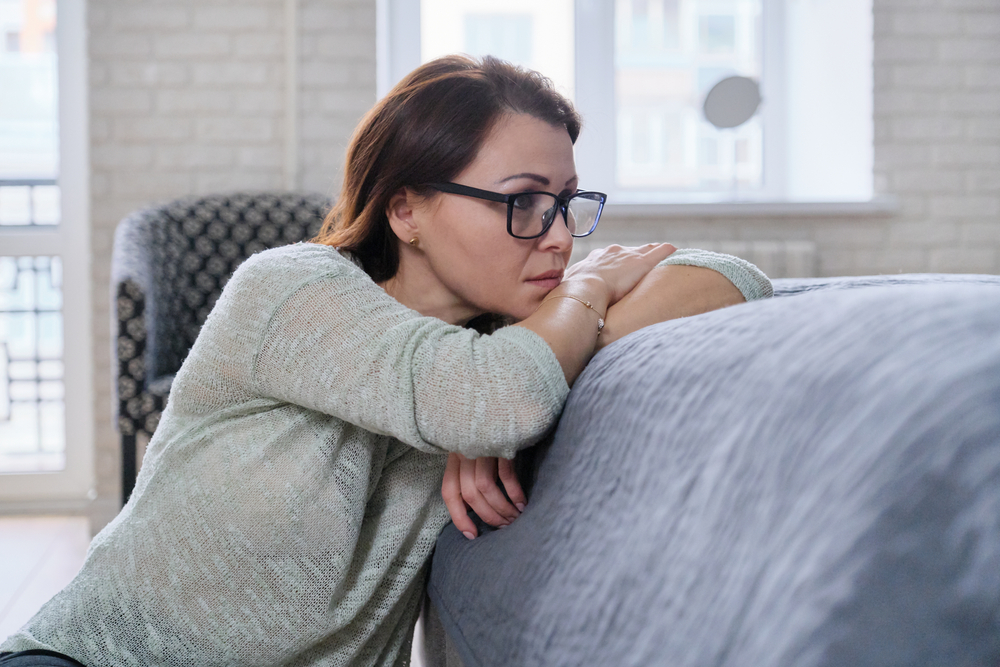DISCLAIMER: Always consult with a healthcare professional before starting any new routines, programs, or nutrition plans to ensure you receive the best medical advice and strategy for your specific individual needs.
You were always an easy-going, high-energy person with a can-do attitude whatever life threw your way. You never had any problems juggling all plates: keeping up with the kids, looking after the household, volunteering, attending friend reunions, and keeping all projects and tasks on track.
Suddenly, you just don’t feel right. Your periods start to get crazy heavy or erratic and you are desperate for a good night’s sleep. And it’s not just the night sweats and hot flashes. Your temper and tolerance levels get shorter and you find yourself annoyed, grouchy, and easily upset. You tell your sister what’s happening to you and she suggests that you test for some hormonal conditions. You visit the hospital for a test only to find out you are on the cusp of perimenopause. And you just turned 45.
As frightening as this may seem, you are not alone. According to WHO, the majority of women start to notice perimenopausal symptoms at around 45 – 50. Sometimes it can happen earlier, like in your 20s or early 30s. Or it can happen for reasons like cancer treatments and surgical procedures to remove the uterus or ovaries. And sometimes it happens for an unknown reason. Symptoms also vary, from mild to severe enough to require medical attention.
Fortunately, knowledge of aging and its impact on reproductive function has grown and so are the options for perimenopause treatment. So, let’s look at the symptoms of perimenopause and what you can do to take care of yourself.
But first.
What Is Perimenopause?

Perimenopause is a transition state during which estrogen levels begin to fluctuate, the ovaries run out of eggs, and periods become longer, shorter, lighter, heavier, or irregular. It is part of the natural aging process and a period that marks the transition to menopause and the end of a woman’s reproductive years.
Perimenopause lasts about 4 years on average but some women may experience symptoms for 10 years while others for just a few months. The transition period ends with menopause when the ovaries stop producing estrogen and releasing eggs and you no longer have periods.
What Are The Main Symptoms Of Perimenopause?

Here are a few of the symptoms to look out for.
1. Change In The Menstrual Cycle

Your menstrual cycle becomes irregular and lasts several days shorter or longer than usual. Longer cycles usually occur at the later stages and are called anovulatory. This is when you skip ovulation and cannot get pregnant because an egg is not released. Shorter cycles occur due to a drop in estrogen levels which results in a thin uterine lining. Because of this, your period is shorter and lighter.
2. Change Like Menstrual Bleeding
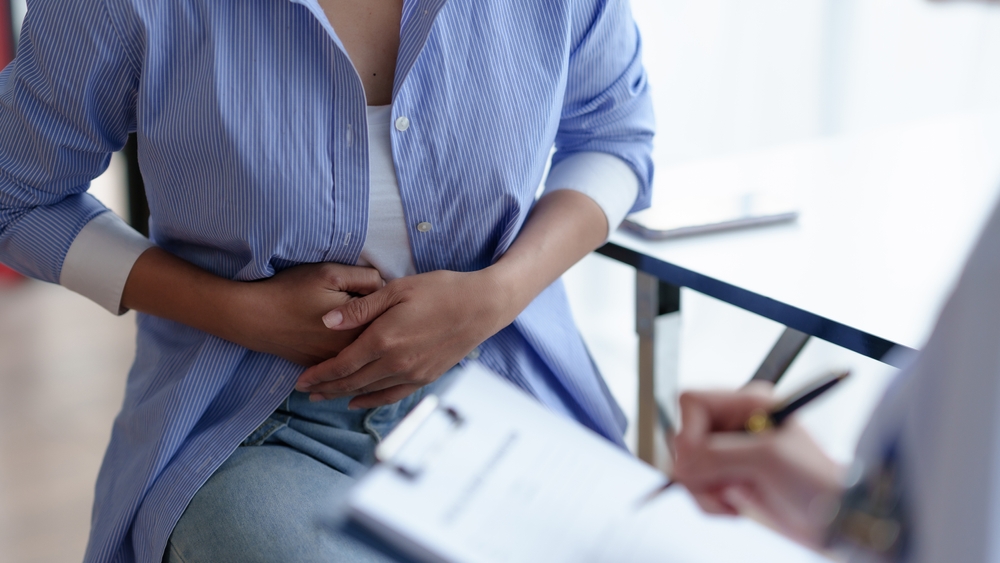
Symptoms of perimenopause also include blood clots, dark or brown blood, and spotting between periods. Heavier periods with blood clots are common during the transition to menopause.
Clots occur due to blood building up in the uterus, which the lining expels during menstruation. Spotting between periods is also common and associated with an imbalance in estrogen levels. You may spot it at the start or end of your period. Also, as menstrual blood ranges in color from dark brown to bright red, a dark, brown, or black period is a sign of blood taking longer to leave the uterus. Changes in texture may also occur, from thick and clumpy to watery and thin.
3. Headaches Or Migraines
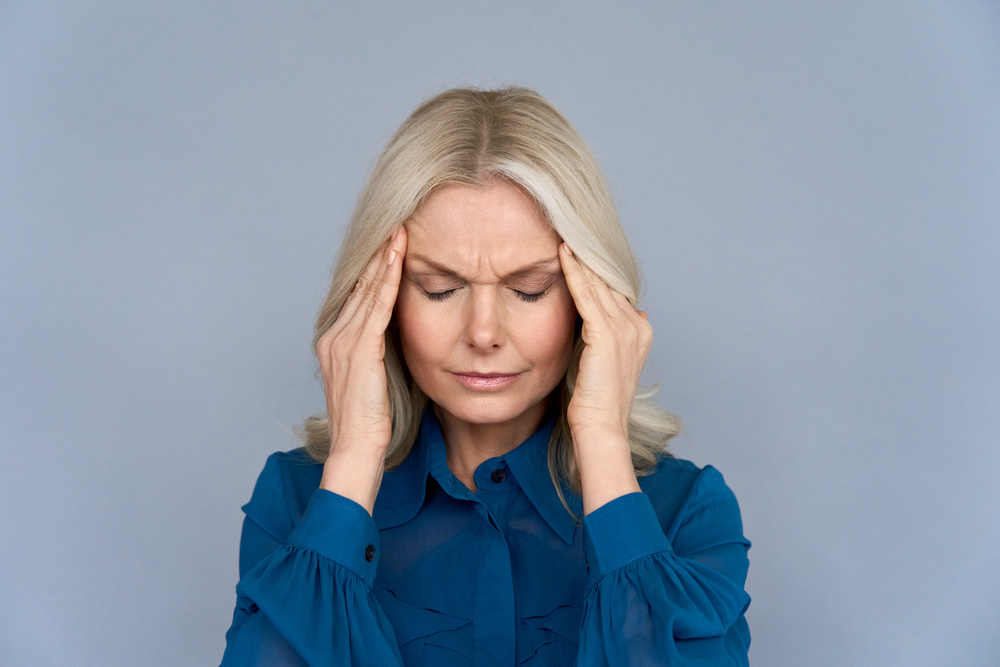
If you have a history of hormone-related migraines, episodes can become more severe or frequent. This is mainly due to hormonal fluctuations, with estrogen production rising and falling unevenly. Heavier periods are also associated with more severe migraine symptoms.
While a heavy flow can come with a multitude of complications, from blood clots to cramps, it is also a risk factor for iron deficiency, which is associated with migraine. In general, hormonal changes during perimenopause may cause all types of headaches and not just migraine.
4. Clumsiness

Increased clumsiness during perimenopause is associated with changes in hormonal levels. Loss of balance, tripping, running into furniture, and bumping into things are all symptoms linked to fluctuations of testosterone, progesterone, and estrogen.
The drop in hormonal levels may also result in increased bruising. As estrogen levels drop, your body begins to produce less collagen, resulting in dryer and thinner skin which bruises more easily.
5. Sleepiness During The Day
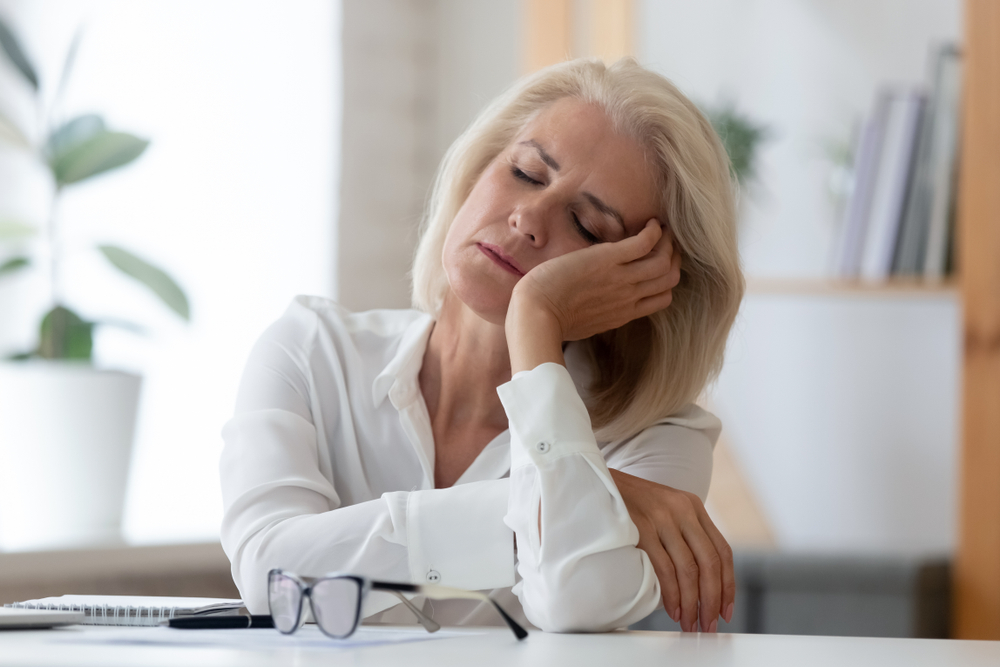
Fatigue, which is more common during the later phases, also occurs as a result of hormonal changes. As the levels of progesterone and estrogen drop, the adrenal and thyroid glands are also affected.
These glands produce hormones that regulate cellular metabolism and when an imbalance occurs, the symptoms range from anxiety and irritability to fatigue and low energy. Fatigue, which can be mild or severe, is also linked to poor sleep quality, leading to tiredness and sleepiness in the daytime.
6. Sleep Disturbances And Insomnia
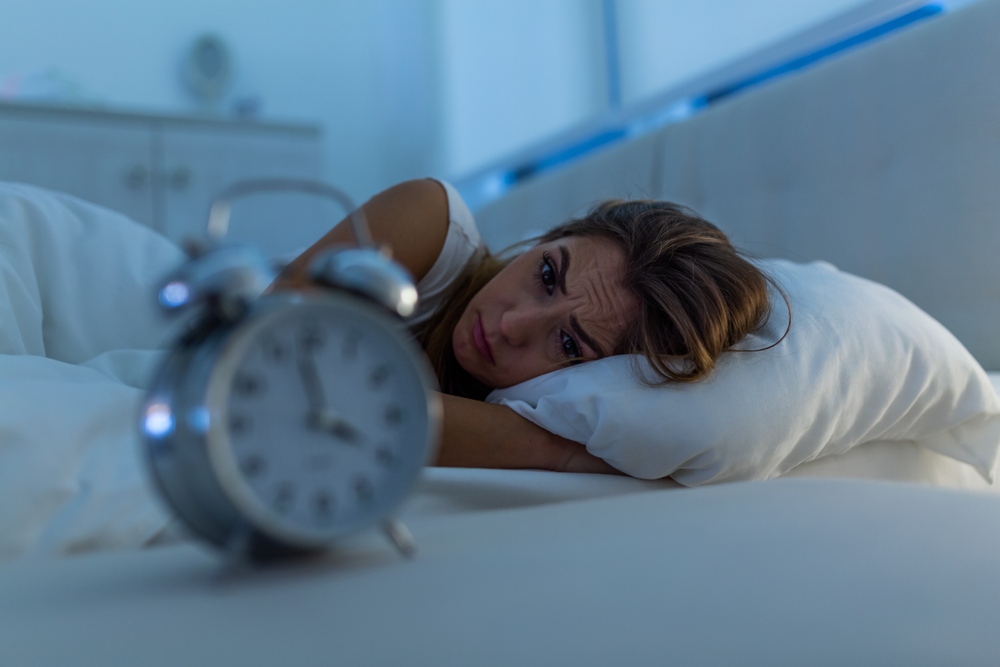
Sleep disturbances and insomnia are common symptoms of perimenopause. In the U.S., 14% of women report sleep difficulty, which is the most common symptom after weight gain (15 %) (Statista).
While hormonal changes play a major role, hot flashes and sweats at night also impact sleep quality. As a result, you may feel stressed, irritable, anxious, and fatigued, find it more difficult to stay focused and remember things, and become more prone to accidents and errors.
7. Muscle Cramps
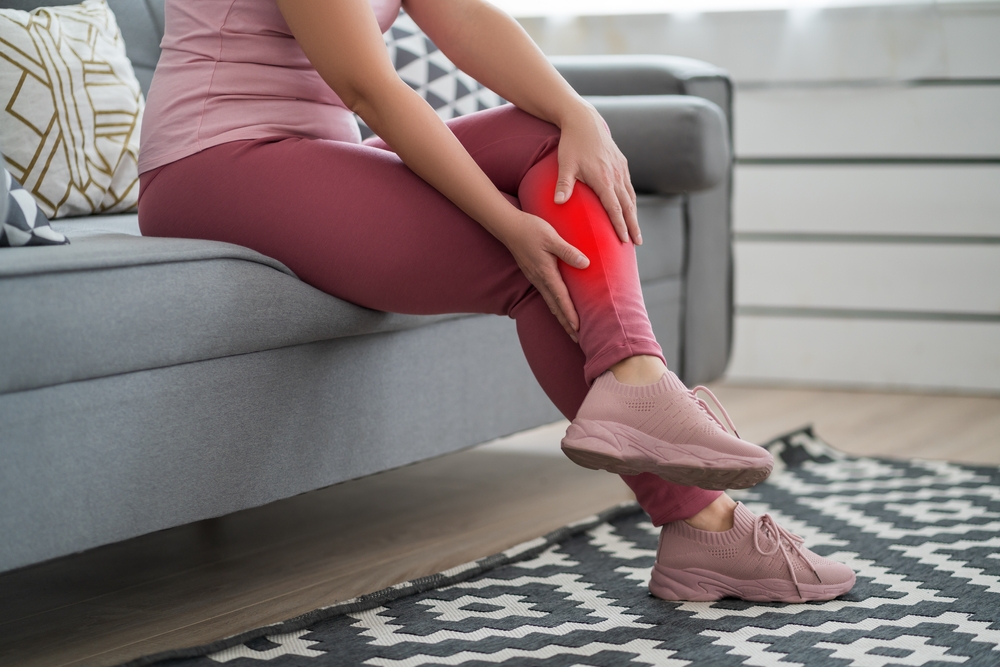
Muscle aches and spasms and painful cramps occur during perimenopause, disrupting women’s quality of life. One reason for cramping is that when progesterone and estrogen levels drop, the movement of food through the digestive system is affected, resulting in inadequate magnesium absorption (Cureus). Yet, magnesium is important for proper muscle function and when levels drop, the muscles contract too much and get tight, causing spasms and cramps.
Also, during perimenopause, the ovaries produce less progesterone and estrogen, both of which help regulate the body’s hydration levels. Estrogen, in particular, makes it easier for the body to retain fluids and lower levels may cause dehydration. And as water makes up 76% of your muscles (Nutrients), they need proper hydration to contract and relax easily. Dehydration can cause involuntary contractions as the muscles become very sensitive.
8. Pain In The Lower Back, As With Menstruation, But Not Associated With It

While trouble sleeping, hot flashes, night sweats, and mood swings are all associated with a drop in estrogen, reduced levels also result in a slower rate of collagen production.
Collagen, however, is found in the joints, ligaments, tendons, and muscles and reduced deposition increases the risk of different musculoskeletal conditions, including lumbar disc degeneration (Molecular Medicine Reports). Contributing factors include weight gain, reduced bone density, and inflammation which occurs more often during menopause, further exacerbating pain (Journal of Neuroinflammation).
9. Frequent Urge To Urinate, Not Associated With Increased Fluid Intake, Involuntary Urination During Coughing, Sneezing, Or For No Reason
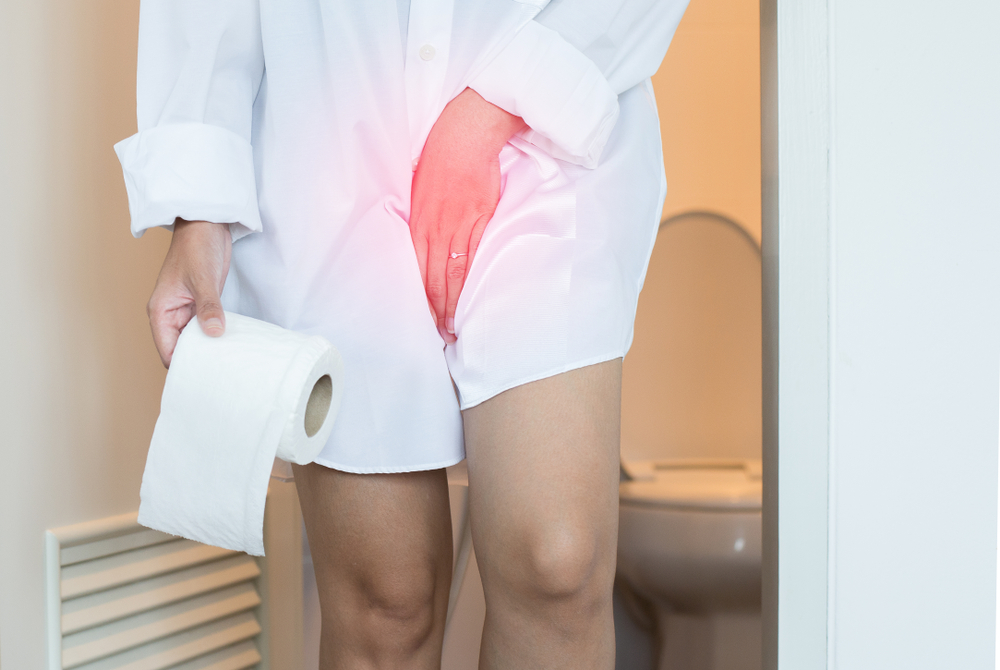
Before the transition to menopause, healthy estrogen levels help maintain the flexibility and strength of the bladder and pelvic tissues. As estrogen decreases, the lining of the urethra becomes thinner while the pelvic floor muscles get weaker over time. As a result, some women experience urinary incontinence and unintentional loss of urine.
The two main types are urge and stress incontinence. The latter occurs when physical activity or movement such as lifting, running, laughing, or coughing puts pressure on the urethra and bladder. Urge incontinence occurs when the bladder spasms and you feel a sudden, strong, and frequent urge to urinate.
10. Appetite Changes And Eating Habits

Changes in hormonal levels, and ghrelin and estrogen, in particular, can make you hungry during perimenopause. Ghrelin, which is produced by the pancreas, small intestine, brain, and stomach, is known as the hunger hormone. The levels of ghrelin increase in perimenopausal women, causing changes in appetite.
Recent research supports the correlation between food cravings and higher levels of ghrelin. Factors contributing to increased appetite and subsequent weight gain include chronic stress and higher insulin and cortisol. Estrogen has also been shown to regulate and inhibit appetite in women. As estrogen drops during menopause, it may no longer control food intake to the extent it did.
11. Pain In Muscles And Joints
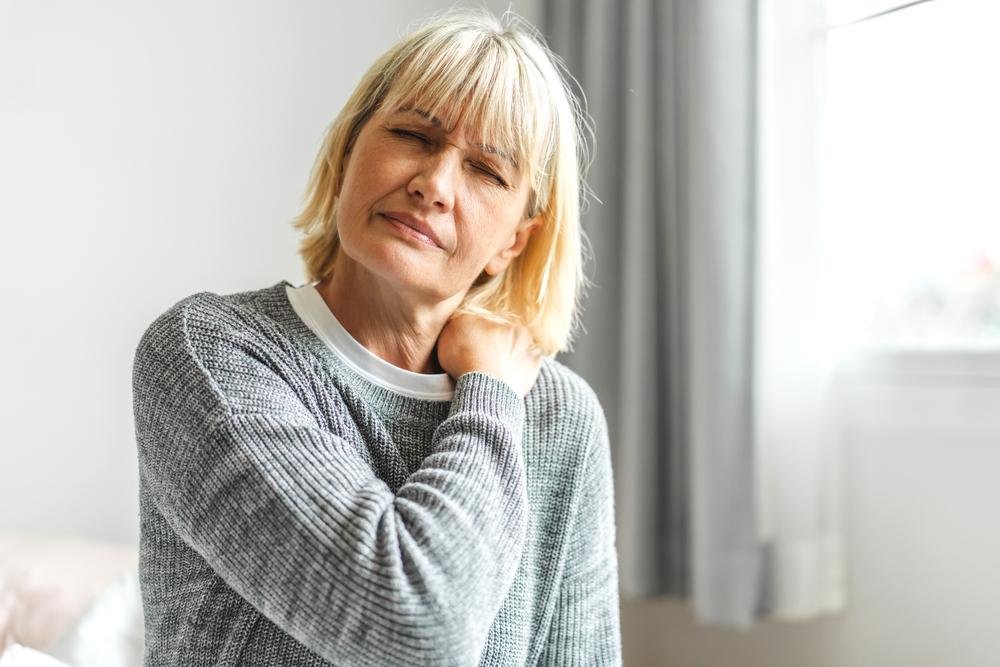
Many women experience pain in the muscles and joints during perimenopause, which can affect the hands, elbows, neck, shoulders, and knees. Studies reveal that 1 in 6 women experiences pain and prevalence is significantly higher in postmenopausal and late and early menopausal women.
Changing levels of estrogen are responsible for muscle and joint pain. As estrogen is an anti-inflammatory factor, lower levels increase the risk for inflammation and conditions like osteoarthritis which is a degenerative joint disease.
Also, as women approach menopause, cortisol levels increase, especially during the late transition stage (Menopause). In addition to increased risk for heart disease, diabetes, and metabolic syndrome, higher levels of cortisol can cause muscle stiffness and fatigue.
12. Black Circles Under The Eyes
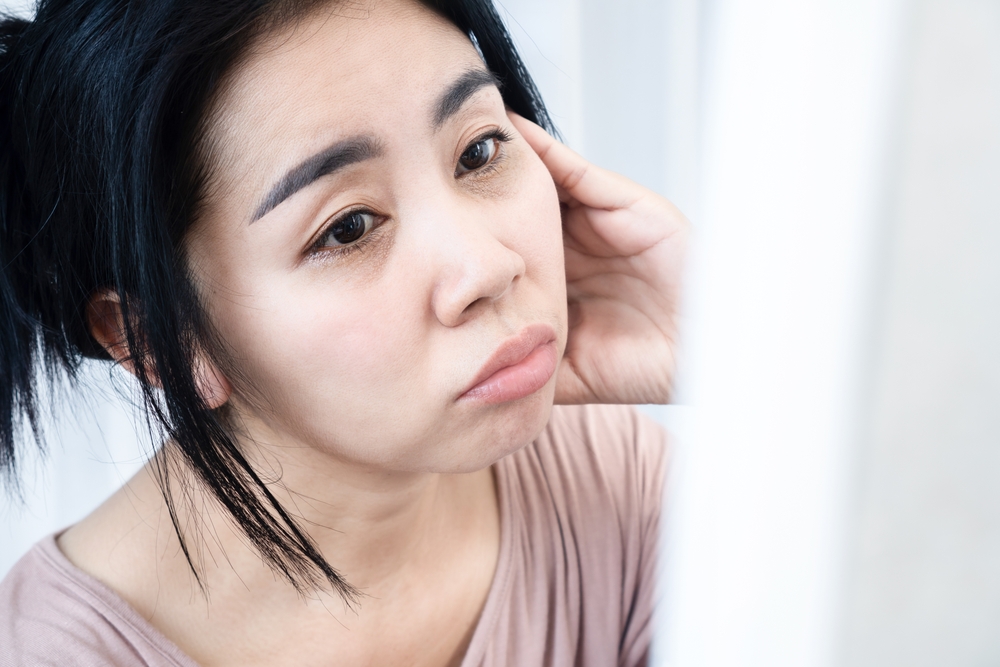
There are several reasons why your skin becomes thin near menopause. Due to a drop in estrogen levels, the body’s ability to retain water decreases, blood circulation becomes more sluggish, and collagen production dips. As a result, the skin becomes less elastic, drier, and thinner, and dark circles under the eyes, wrinkles, and lines become more pronounced.
13. Acne
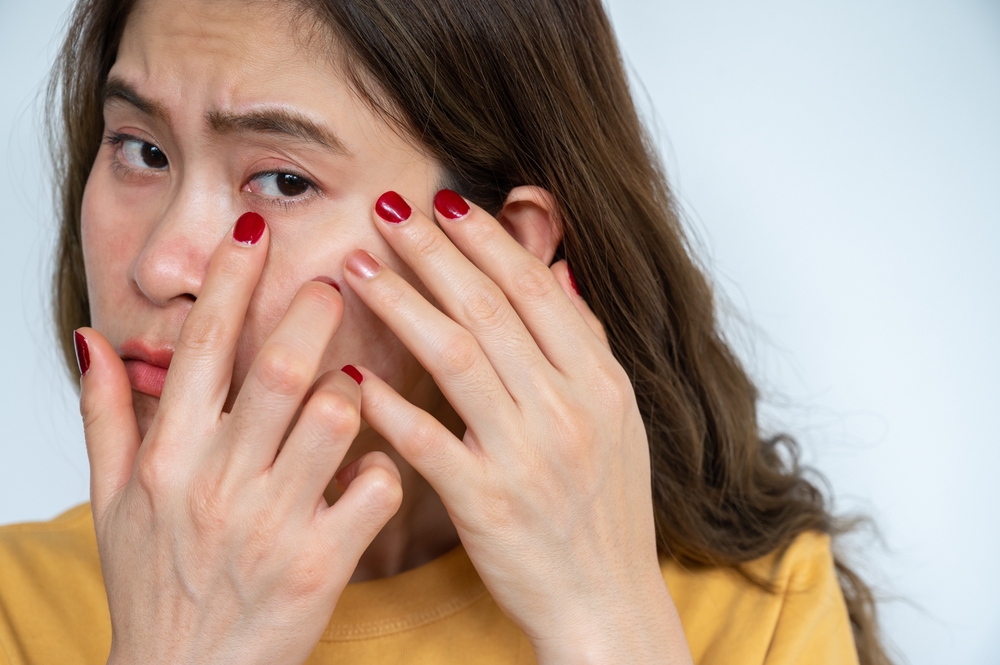
As with other signs of perimenopause, acne develops due to changes in hormonal levels. As estrogen levels decline and testosterone increases, this hormonal imbalance can cause clogged pores and oily skin. These are the same hormones that trigger an acne outbreak during puberty.
Overproduction of testosterone and fluctuations of estrogen in puberty result in excessive sebum production, inflammation, cysts, whiteheads, and blackheads. Stress, anxiety, depression, antibiotics, lack of sleep, and use of skin and hair care products can also trigger or worsen hormonal acne.
14. Milk Glands
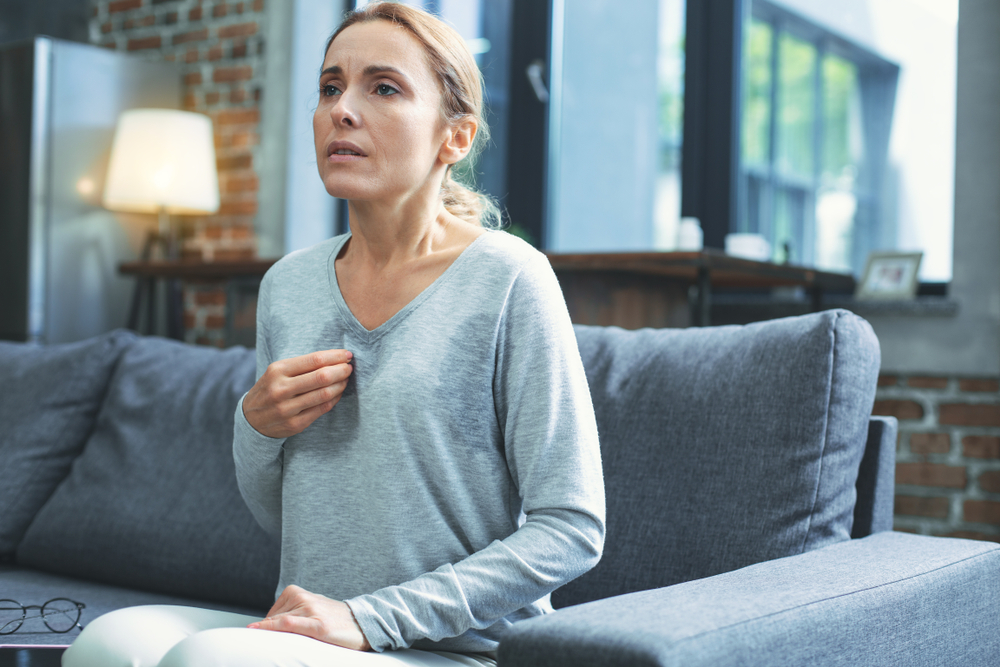
Some women experience a throbbing, sharp, or stabbing pain during perimenopause while others report soreness, burning, and tenderness. One reason why this happens is that hormonal changes make your cycles more unpredictable and erratic.
In premenopausal women, breasts can feel more painful, tender, and swollen before bleeding starts. This is mainly due to a fluid buildup in the tissue. As periods become longer, shorter, and more irregular during perimenopause, pain and tenderness can occur unpredictably.
15. Hot Flashes
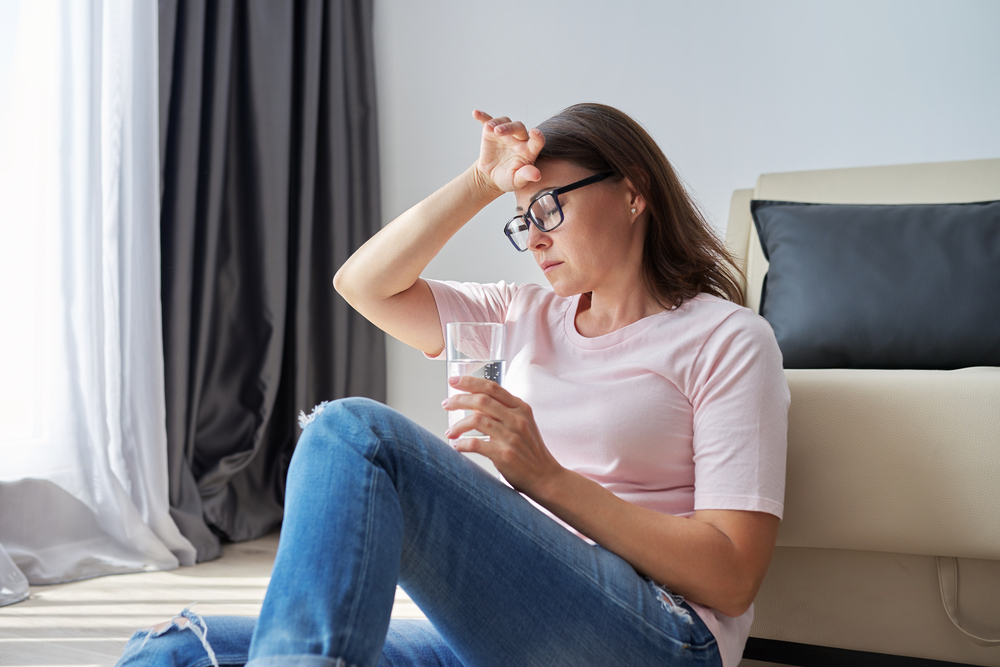
A recent survey shows that 31% of U.S. women aged 35 and over experience hot flashes. While it is unclear what causes them, hot flashes are likely related to a drop in estrogen. Changes in hormonal levels make the hypothalamus more sensitive to fluctuations in body temperature, causing it to react if it senses that you’re feeling too warm.
As only about 1/3 of women experience hot flashes, there is no consensus why some women have them while others don’t. Yet, there could be some contributing factors such as race, obesity, and smoking (Mayo Clinic).
16. Decreased Sex Drive
Loss of libido or decreased sex drive is one of the common symptoms of perimenopause, as reported by 31% of women ages 35 and over (Statista). Loss of libido in perimenopausal women is mainly related to the loss of estrogen near menopause. Higher levels increase sexual desire and lubrication and vice versa.
Other factors that play a role include weight gain, stress, and juggling multiple priorities, like work pressures, elderly parents, and teenage children.
17. Soreness During Intercourse Associated With Insufficient Hydration Of The Vaginal Mucosa
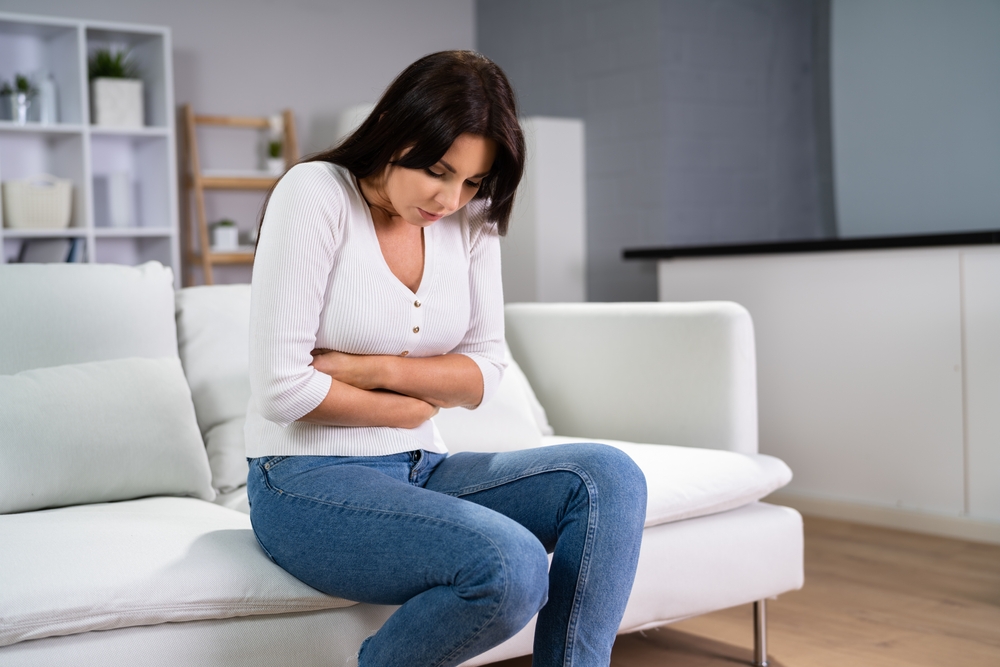
As estrogen levels decline when women transition to menopause, the result is a decreased blood flow to the vagina, causing dryness, soreness, and pain during intercourse. In addition, estrogen helps maintain the vagina’s thickness, elasticity, and lubrication in younger women. When you approach menopause, vaginal lubrication production decreases.
18. Ringing In Your Ears
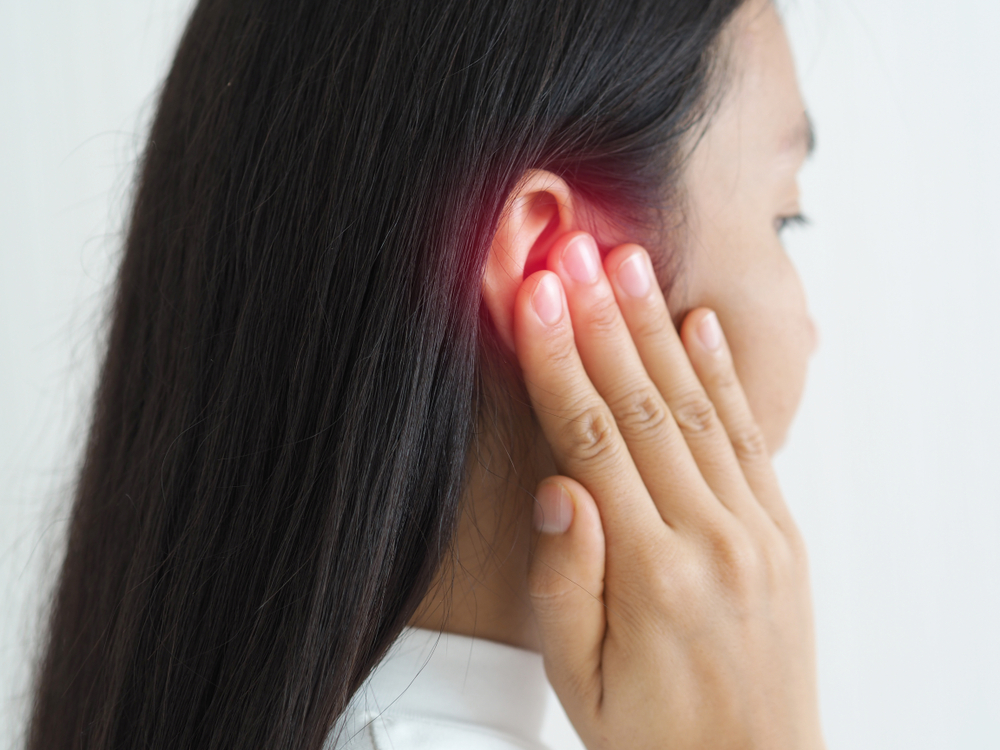
Ringing in the ears, which can feel like buzzing or humming, might be caused by falling hormonal levels. While it is still unknown why it occurs, research suggests that hormones like aldosterone, progesterone, and estrogen play a key role in maintaining a proper auditory function.
As hormonal levels begin to decline, this affects both the cochlear cells and the structures of the ears. As a result, problems that perimenopausal women face include itchy, hot, or blocked years, earache, hearing loss, and ringing or tinnitus.
19. Dizziness, Unsteady Gait
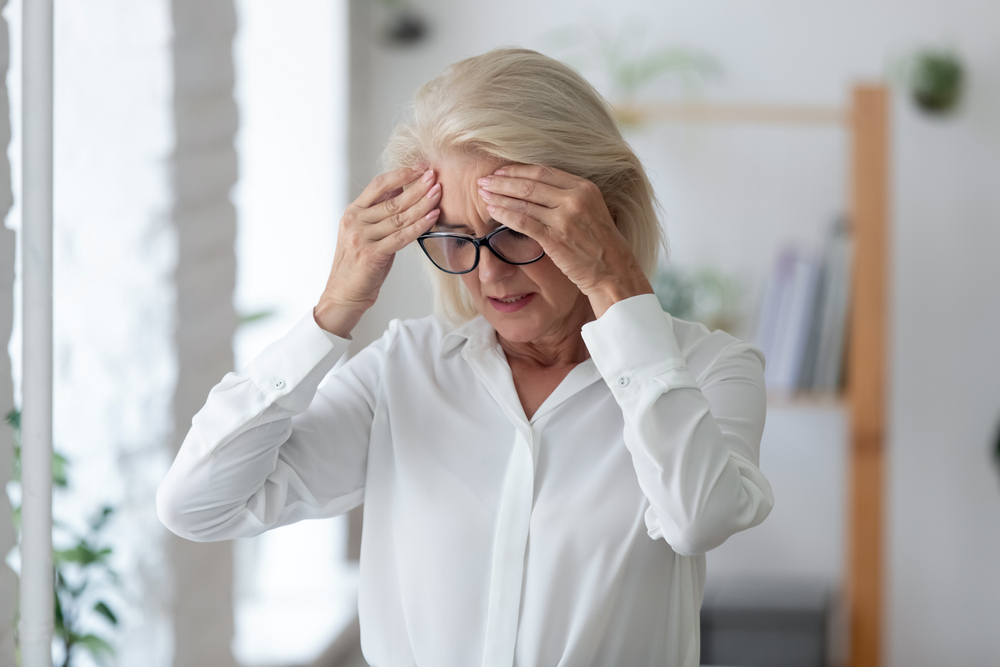
While dizziness is one of the common symptoms of perimenopause, researchers are still unclear why it happens. Possible causes can be unstable blood sugar levels, migraines, fatigue, and hot flashes.
Dizziness can also be caused by reasons other than perimenopause, including low blood pressure, sinus infection, allergies, inner ear disease, anxiety, and dehydration.
20. Weight Gain, Often Unrelated To Changes In Diet And Physical Activity
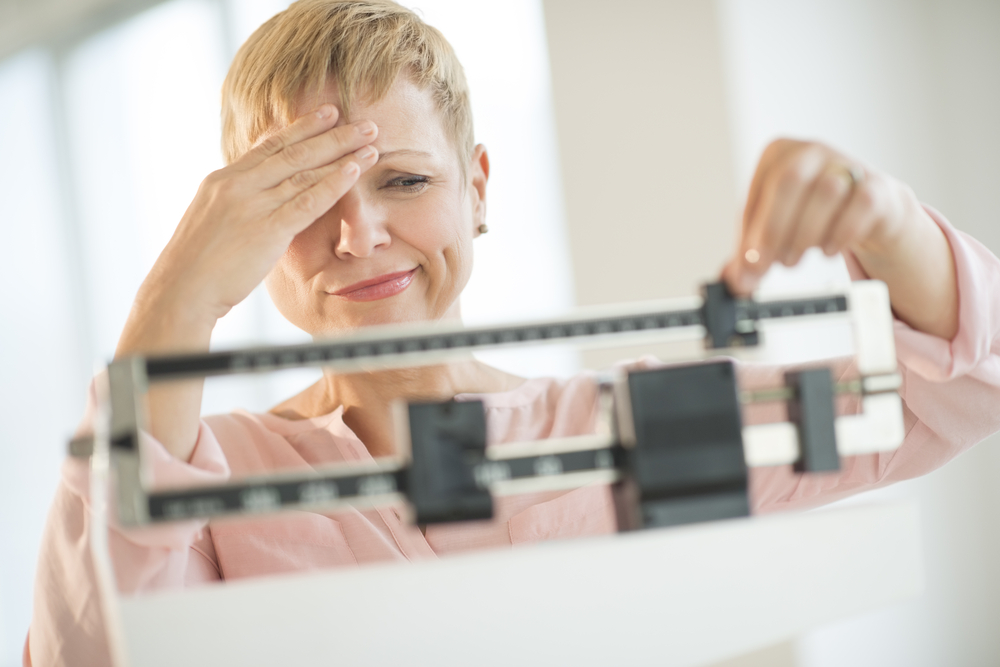
Many women gain weight at or around menopause due to falling estrogen levels. This drop in estrogen levels causes fat redistribution, with up to 20 percent stored around the waistline.
Perimenopausal symptoms such as mood swings, poor sleep quality, and hot flashes can also make exercising and eating healthy more difficult. Other causes of weight gain could be aging and loss of muscle tissue and competing priorities and life pressures that make it harder to maintain a healthy lifestyle.
Perimenopause Treatment: What Can We Do?
Now, that we’ve gone over the most common symptoms of perimenopause, let’s look at a few of the activities that will help counteract its effects.
Physical Activity

Physical activity has a positive effect on women’s musculoskeletal health and perimenopausal symptoms such as irritability, poor sleep, concentration problems, fatigue, and joint stiffness and pain (Obstetrics and Gynecology Clinics of North America). Regular exercise offers several benefits such as preventing weight gain, improvement in mental health, and lowering the risk of osteoporosis, type 2 diabetes, and heart disease.
Exercises that can help include both strength training and light aerobic activity. Strength training includes activities such as hill walking, climbing stairs, heavy gardening, and lifting weights. Such strength activities boost metabolism, increase energy levels, reduce body fat, and improve mental health.
Light aerobic activity helps improve joint health, slows muscle loss, decreases inflammation, and assists in weight management. It can take many forms, from light housework and cooking to swimming, walking, hiking, and practices like yoga.
Healthy Eating

A healthy diet can help alleviate menopausal symptoms, prevent weight gain, and keep bone density. Research, in particular, reveals that a low-fat plant-based diet rich in whole soybeans helps reduce symptoms of perimenopause like night sweats and hot flashes, leading to significant improvements in psychological, physical, and sexual health.
A good way to achieve this is to consume more fruits and vegetables, lean meat, and fish. Also, adding foods that are rich in plant estrogens can help alleviate perimenopausal symptoms. Such foods include carrots, apples, alfalfa, dark berries, cauliflower, and broccoli. When it comes to protein, good sources include chickpeas, nuts and seeds, beans, and tofu.
Maintaining Or Achieving A Healthy Weight

There are a number of factors that contribute to a healthy weight, including stress reduction, regular physical activity, and healthy eating. Moderate levels of exercise not only help burn calories but strengthen your muscles, including major groups like the arms, shoulders, chest, abdomen, back, hips, and legs. As muscle loss during perimenopause slows down metabolism, maintaining muscle strength can help increase the rate at which you burn calories.
A healthy diet near menopause is focused on improving overall diet quality and reduced calorie intake. As you transition to menopause, you don’t need as many calories as you used to. Instead of crash dieting, however, a healthier approach involves eating nutrient-rich foods and cutting back on processed meats, pastries, white bread, and products rich in added sugar and oils. To improve your overall quality of eating, you should have frequent, balanced meals, adding foods that are rich in calcium, fiber, omega-3 fatty acids, and protein.
Lastly, as many women find perimenopause stressful, which can lead to changes in appetite, it is important to find healthy ways to deal with stress. Depending on what works for you, you can practice yoga and relaxation techniques, give yourself positive affirmations, or connect with others, whether family or friends, at the workplace, or through shared activities and community organizations.
Pelvic Floor Training

Perimenopause is associated with an increased risk of several health issues such as urethral irritation, pain with intercourse, urinary incontinence, constipation, and pelvic organ prolapse. While these issues occur due to a multitude of factors, they can be significantly improved through pelvic floor training.
The benefits are many, including better bowel and bladder control, prolapse prevention, reduced back pain, posture support, and increased sexual sensation. The types of exercises that help strengthen the pelvic floor include bridges, squats, bird dogs, split table tops, and Kegel.
Get Rid Of Bad Habits

A holistic approach to perimenopause treatment should focus on healthy lifestyle changes and getting rid of habits that make symptoms worse. Such habits are relying on caffeine, using alcohol to make you sleep, staying up late, skipping meals, and stress or emotional eating.
Skipping meals, for example, confuses metabolism, triggers adrenaline and anxiety symptoms, and can cause digestive issues like diarrhea and constipation. Relying on caffeine is associated with a higher likelihood of vasomotor symptoms such as night sweats and hot flashes (Menopause).
Psychotherapy

Focused on changing negative thoughts and behaviors, cognitive behavioral therapy can help with a range of conditions, including depressed mood, stress, irritability, anxiety, and sleep problems. The goal is to help patients change dysfunctional emotions and thought patterns and learn effective coping strategies.
For example, in response to symptoms like palpitations, hot flashes, or night sweats, dysfunctional thoughts can be “I will never get this finished” or “how worse can it get”. Naturally, such thoughts can make you feel worried, upset, stressed, and anxious.
Cognitive behavior therapy can help you unlearn this pattern so that you replace dysfunctional thoughts with more realistic ones. Like, say you feel a hot flash coming on. You feel worried and embarrassed that everyone will notice it. Then you come to realize that this is unlikely and remind yourself that hot flashes are just temporary inconveniences.
Ask For Support From Loved Ones Or Someone Who Has The Same Experience

If you’re around menopause and symptoms are causing you to suffer, ask for support from family, colleagues, and friends. Be honest about how you feel and keep the lines of communication open. If you have children and a partner, tell them what you are going through and how they can help as they don’t know necessarily how.
Wrapping Up

Perimenopause can have a host of effects on your body, from hot flashes and night sweats to mood swings, insomnia, and weight gain. And like many of us, you are probably busy keeping projects on track, dealing with teenagers, stressing over money, and taking care of aging family members. It can be a confusing and busy time in life, and it’s normal to feel emotional.
Make sure you understand the symptoms perimenopause comes with and make sure you take an extra effort to take care of yourself. We hope this guide helps with this important task. Self-care and self-love are the best gifts you can give yourself when life seems tough.
DISCLAIMER: Always consult with a healthcare professional before starting any new routines, programs, or nutrition plans to ensure you receive the best medical advice and strategy for your specific individual needs.


 By Team THOR
By Team THOR
